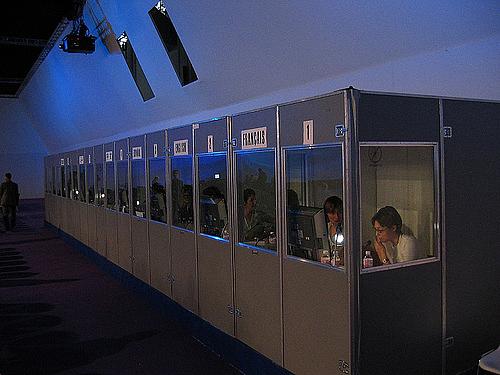Misplaced metaphors and other things that can wreck health translations

Alanna Shaikh has spent about ten years working in international development. Originally from Syracuse, New York, she works on global health, aid programs and policy, most currently for an international aid project in Tajikistan.
Shaikh blogs for AidWatch, End the Neglect, UN Dispatch, and her fascinating and candid personal blog, Blood and Milk. She speaks French and Uzbek and, to a lesser extent, Russian, Arabic and Urdu.
But even Shaikh sometimes struggles with translations and translators. In an October post on her blog, she explained some of the pitfalls of translation. Jokes often cause confusion, for example. "They're just too cultural and based on language and tone nuance," she wrote. Colloquialisms, such as "hard" and "soft" for estimations, or "drop" or "fall" for decreases, also don't translate well.
Sharing personal history – like photos of your kids -– is a great to connect with people regardless of the language they speak. "I've seen other people successfully transcend language and culture barriers by talking about a dislike of mushrooms, fear of snakes and bugs, mocking people who are drunk, alluding to sex, and comparing government officials to babies," Shaikh explained.
This week in Career GPS, Shaikh is expanding on her experiences translating health concepts. She answered questions by email and over Skype from Tajikistan and our exchange has been edited for clarity.
Angilee Shah: Do you have any specific advice about talking about health issues through a translator? Are there any pitfalls with the vocabulary we use to describe health conditions?
Alanna Shaikh (left): I've had health in translation hit two major hurdles (which, by the way, is another sports metaphor translators don't get):
1. Many languages don't actually have "nice" words for genitals. So there is no neutral, clinical way to talk about reproductive health. Imagine trying to teach a woman about condoms or an IUD if you couldn't say penis, vagina, or intercourse but had to say (cruder words).
2. We use a lot of war metaphor in our health language. We battle cancer, fight disease -- even our immune systems attack invaders. When translated literally, that can be violent and confusing.
Are there any particular languages that have tripped you up in your communications? For example, in Spanish, the literal translation of "sugar" means only the granular stuff, not necessarily the sugars found in fruits, etc. [See Megha Satyanarayana's post about her difficulties translating the word.] How do you work around these issues?
In Uzbekistan, levels of health knowledge are very low in rural areas. I once had to use an anatomy book and actually teach my translator what all her internal organs were before we could work out translation for the workshop I was planning.
In general, I think the key to avoiding problems is to get to know your translator. Sit down with them before the work starts, and go over the general topics you'll be covering. That gives you the chance to get a sense of their level of skill on the topic, and for them to ask questions or share any concerns.
Also in Uzbekistan, I was at a roundtable with a foreign expert who was collecting information on women's lives in Uzbekistan. He asked about FGM [female genital mutilation]. The translator didn't know what it was, and once he explained, she actually went pale and said "People do that?" She was so shaken up she had trouble working for the next few hours.
When you read reports on global public health, what do you think journalists get wrong most often? Do you see translational problems in the media?
Either they misread the science and draw big unwarranted conclusions, or they think things are new and novel which aren't. Or they don't understand local context, which at times can be a translation issue.
On a more practical level, does a good translator have to be expensive? What do you look for when you are hiring someone?
Good translators are generally expensive. You could luck out with a student or someone with a knack for translation, but you're safer with a professional. I look for health knowledge as well as language skills, and with an interpreter, speed.
Shaikh also runs an international development careers list (there's a small fee), if you're looking for the inside scoop on jobs in her field.
Read more about health care and translation:
The Mental Health of Asian Immigrants: "Building the plane while we fly"
Interpreting Health: Medical Translation in a City of Immigrants
(Photo of translator booth by dweekly on Flickr Creative Commons)

